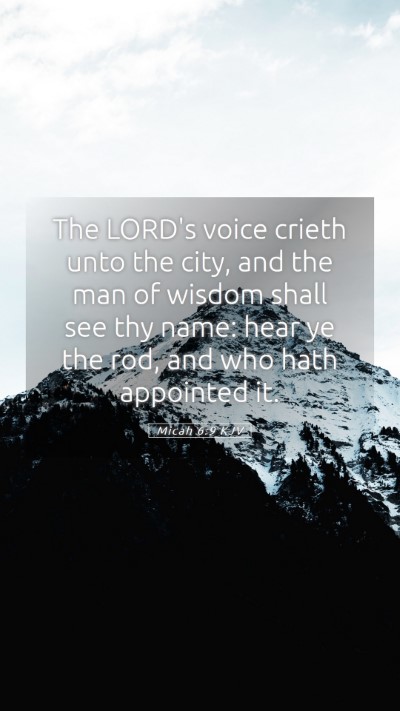Old Testament
Genesis Exodus Leviticus Numbers Deuteronomy Joshua Judges Ruth 1 Samuel 2 Samuel 1 Kings 2 Kings 1 Chronicles 2 Chronicles Ezra Nehemiah Esther Job Psalms Proverbs Ecclesiastes Song of Solomon Isaiah Jeremiah Lamentations Ezekiel Daniel Hosea Joel Amos Obadiah Jonah Micah Nahum Habakkuk Zephaniah Haggai Zechariah MalachiMicah 6:9 Meaning
What is the meaning of Micah 6:9?
The LORD's voice crieth unto the city, and the man of wisdom shall see thy name: hear ye the rod, and who hath appointed it.
Micah 6:9 Bible Verse Meaning
Understanding Micah 6:9: A Comprehensive Bible Verse Commentary
Micah 6:9 is a pivotal verse that encapsulates the essence of God's message to His people, shedding light on themes of divine justice and accountability. This verse beckons us to delve into the intricacies of its meaning by examining insights from respected public domain commentaries such as those by Matthew Henry, Albert Barnes, and Adam Clarke. As we explore this verse, we will provide Bible verse meanings, Bible verse interpretations, and Bible study insights to deepen our understanding of Scripture.
Verse Context and Meaning
Micah 6:9 states:
"The Lord's voice cries unto the city, and the man of wisdom shall see thy name: hear ye the rod, and who hath appointed it."In this passage, we see God addressing a community that has strayed from righteousness. The "voice of the Lord" calls out to the people, highlighting God's desire for them to recognize their sins and return to a path of justice and obedience.
Insights from Commentaries
-
Matthew Henry:
Matthew Henry points out that this verse serves as a warning. The "rod" symbolizes God's judgment, urging the people to listen closely. He emphasizes the importance of wisdom in acknowledging God's attributes and responding accordingly to His call for repentance.
-
Albert Barnes:
Barnes elaborates on the phrase "the man of wisdom shall see thy name". He interprets this as a call to discernment, where true wisdom is found in recognizing God's holiness and understanding the implications of one's actions. The verse calls the wise to heed God's message and encourages them to guide others towards understanding God's righteousness.
-
Adam Clarke:
Adam Clarke interprets the term "hear ye the rod" as an imperative to comprehend the consequences of sin. He connects this with the notion of divine discipline, where the rod serves not merely as punishment but as a means of correction and aligning believers with God's will.
Key Themes in Micah 6:9
The themes found in Micah 6:9 are essential for understanding the broader message of the Book of Micah and the prophetic literature as a whole.
-
Divine Justice:
The verse highlights God's expectation for justice, urging His people to consider their actions and their alignment with His law.
-
Call to Repentance:
The cry of the Lord serves as an invitation for repentance. The community is beckoned to acknowledge its transgressions and return to a rightful relationship with God.
-
Wisdom and Insight:
The emphasis on the wise man signifies the importance of spiritual discernment in understanding and applying God's teachings amidst life's complexities.
Application of Micah 6:9 in Daily Life
Understanding Micah 6:9 extends beyond academic analysis; it invites individuals to engage in practical applications in their lives.
-
Listening for God's Voice:
In a world filled with distractions, the call to listen for the Lord’s voice encourages believers to seek moments of quiet reflection and prayer to discern His guidance.
-
Personal Accountability:
Just as the Israelites were reminded of their accountability, modern believers are urged to evaluate their lives, ensure they align with God’s teachings, and make necessary corrections.
-
Encouraging Others:
Inspired by the verse's message, individuals can take the initiative to share insights and encourage others in their spiritual journeys, fostering a community that values wisdom and righteous living.
Cross References for Deeper Understanding
To further understand the themes in Micah 6:9, consider these related verses:
- Proverbs 1:7: "The fear of the Lord is the beginning of knowledge" - highlighting the importance of wisdom in approaching God.
- Isaiah 1:18: "Come now, let us reason together" - an invitation to repentance and discourse with God.
- Lamentations 3:1-3: Reflecting on suffering as a result of straying from righteousness.
Conclusion
Micah 6:9 serves as a profound reminder of God's call to justice, wisdom, and accountability. Through the analyses provided by respected commentators, this verse offers foundational insights that can be applied within personal and communal settings. For those involved in Bible study groups or seeking online Bible study resources, Micah 6:9 presents an opportunity for in-depth Bible verse analysis, encouraging individuals to engage with Scripture meaningfully and reflectively.


